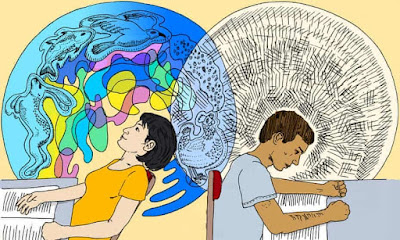Learning is a process of gaining knowledge. This series of articles will summarise the power of active learning!
Learning, in simple terms is the process of acquiring information from the environment and committing to long-memory to be able to retrieve it when necessary.
We are just beginning to understand the process of learning and how the brain learns. Yet, there is a huge divide between knowledge and the practice of learning.
Majority of us still practice traditional learning and teaching methods which were developed with little understanding about human brain and the physiology of learning. Mankind is leaving a lot of its potential untapped due to the flawed system of learning. Understanding the neuroscience of learning, developing and implementing learning - teaching methods based on that would pave the way for a progressive future.
What happens when we learn something?
Information attentively acquired through senses( vision, hearing etc.) is retained in working memory for few seconds(INPUT). From here, the information is converted or rather encoded into long-term memory. Encoding occurs by processing the information and associating it with the existing information(PROCESS).
Information thus stored in long-term memory can then be retrieved when needed(OUTPUT). Retrieval in turn reinforces the memory by strengthening/ widening the associations and helps to keep the dreaded enemy, "forgetting" at bay.
Traditional learning methods however are obsessed solely with the INPUT - the acquisition of information. Many of us spend most, as much as 90% of our learning time in reading books or listening to lectures. However, we forget a major part of what we learnt within a short time and reflexively we tend to compensate by repetition. Although we can prolong the duration of memory by a few hours/ days by re reading the same chapter or listening to lectures over again, these methods are inefficient to say the least.
Science has shown retrieval or active recalling to be a far superior method.
Someone is better served by trying to recall what he/she has learnt from memory and filling up the gaps than by rereading a chapter or listening to a lecture over again.
As discussed earlier, retrieval enhances the associations and fortifies the memory.
You might be wondering whether this is practically feasible? Of course.
After you read a chapter or listen to a lecture take a break of 10- 20 minutes and try to recall what you have learnt. Try to actively recall as much as possible and in the process you will be able to identify the gaps in your memory. Go back to the book/ lecture and fill the gaps. Focus only on the gaps.
Try to recall again within 12 - 24 hours again. You will find it much easier to recall this time and your knowledge will now have fewer gaps. Fill the gaps again.
If you are satisfied with the extent of your recall, you can leave as long as a week before your next attempt to recall. If not you can attempt to recall after 24 hours.
This method known as spaced retrieval. It has been proven that the retention of information is much better in this method compared to re- reading despite being easier and less time consuming than the latter.
Considering this, instead of traditional syetems which allocate upto 90% of the learning time in acquisition of information, a 50 -50 model where half the time is allocated to active recall would be more beneficial. In fact, some researches suggest spending upto 70% for active recall!
So, it that the elixir to all your problems in learning? Are you going to become the perfect learner with this method?
Sorry my friend, we are only beginning to scratch the surface. However practicing retrieval is a basic and simple technique that would definitely hold you in good stead.
Just remember to recall!😉














COMMENTS